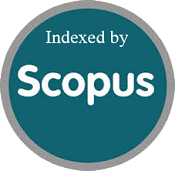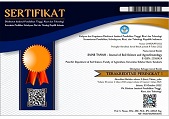Enhancing Chromium Phytostabilization Using Chelator (Agrobacterium sp. I26 and Manure) to Support Growth and Quality of Rice (Oryza sativa L.)
Abstract
Keywords
Full Text:
PDFReferences
Abbassi, S. S., Abbassi, N., & Soni, R. (1998). Heavy metals in the environment. New Delhi, India: Mittal Publication.
Agrawal, V., & Sharma, K. (2006). Phytotoxic effects of Cu, Zn, Cd, and Pb on in vitro regeneration and concomitant protein changes in Holarrhena antidysenterica. Biologia Plantarum, 50(2), 307–310. https://doi.org/10.1007/s10535-006-0027-z
Aji, A., Masykuri, M., & Rosariastuti, R. (2017). Phytoremediation of Rice Field Contaminated by Chromium with Mendong (Fimbristylis globulosa) To Supporting Sustainable Agriculture. In Borderless Communities and Nations with Borders: Challenges of Globalisation. Yogyakarta: the International Indonesian Forum for Asian Studies (IIFAS).
Alkhalaf, N. A., Osman, A. K., & Salama, K. A. (2007). Monitoring of aflatoxins and heavy metals in some poultry feeds. African Journal of Food Science., 4(4), 192–199.
Alvernia, P., Minardi, S., & Suntoro, S. (2017). Zeolite and Organic Fertilizer Application to The Improvement of Available P and Soybean (Glycine max L) Seed Yield in Alfisols. Sains Tanah - Journal of Soil Science and Agroclimatology, 14(2), 83–89. https://doi.org/10.15608/stjssa.v14i2.839
Anggriawan, & Indrawati, T. (2013). Peranan Komoditi Gambir Terhadap Perekonomian Kabupaten Lima Puluh Kota Provinsi Sumatera Barat. Jurnal Ekonomi, 21(2), 1–21.
Antonius, S., Agustyani, D., Imamuddin, H., Dewi, T. K., Laili, N. (2014). Kajian Bakteri Penghasil Hormon Tumbuh IAA Sebagai Pupuk Organik Hayati dan Kandungan IAA Selama Penyimpanan. Prosiding Seminar Nasional Pertanian Organik. 279–285.
BPS. (2017). Kecamatan Kebakkramat Dalam Angka 2017. Karanganyar: Badan Pusat Statistik Kabupaten Karanganyar.
Cervantes, C., Campos-Garcı́a, J., Devars, S., Gutiérrez-Corona, F., Loza-Tavera, H., Torres-Guzmán, J. C., & Moreno-Sánchez, R. (2001). Interactions of chromium with microorganisms and plants. FEMS Microbiology Reviews, 25(3), 335–347. https://doi.org/10.1016/S0168-6445(01)00057-2
Etesami, H. (2018). Ecotoxicology and Environmental Safety Bacterial mediated alleviation of heavy metal stress and decreased accumulation of metals in plant tissues : Mechanisms and future prospects. Ecotoxicology and Environmental Safety, 147(July 2017), 175–191. https://doi.org/10.1016/j.ecoenv.2017.08.032
Government Regulations Republic of Indonesia Number 101 year 2014 about Management of Hazardous and Toxic Wastes.
Gururajan, K., & Belur, P. D. (2018). Screening and selection of indigenous metal tolerant fungal isolates for heavy metal removal. Environmental Technology & Innovation, 9, 91–99. https://doi.org/10.1016/J.ETI.2017.11.001
Hadisumitro, L. (2002). Membuat Kompos. Jakarta: Penebar Swadaya.
Handayanto, E., Krisnayanti, B., & Muddarisna, N. (2018). Potensi Pohon Lokal untuk Fitostabilisasi Logam Berat pada Tanah Tercemar Limbah Sianidasi Emas di Lombok Barat. Jurnal Lahan Suboptimal, 4(1), 71–80.
Hatta, M. (2012). Uji Jarak Tanam Sistem Legowo terhadap Pertumbuhan dan Hasil Beberapa Varietas Padi Pada Metode SRI. Jurnal Agrista, 16(2), 87–93.
Hidayati, N. (2005). Fitoremediasi dan Potensi Tumbuhan Hiperakumulator. HAYATI Journal of Biosciences, 12(1), 35–40. https://doi.org/10.1016/S1978-3019(16)30321-7
Nagarajan, M., & Ganesh, K. S. (2015). Growth and Nutrient Uptake of Paddy (Oryza sativa L.) under Chromium(VI) Treatment. International Journal of Environment and Bioenergy Int. J. Environ. Bioener, 10(2), 115–121.
Patola, L. N. P., Supriyono, S., & Pardjanto, P. (2017). Effect Use Biofertilizer and Differences Type Soil on Growth and Yield Arrawroot. Sains Tanah - Journal of Soil Science and Agroclimatology, 14(1), 29–35. https://doi.org/10.15608/stjssa.v14i1.600
Pramono, A., Retno Rosariastuti, M., Ngadiman, N., & Prijambada, I. D. (2012). Peran Rhizobakteri Dalam Fitoekstraksi Logam Berat Kromium Pada Tanaman Jagung. Jurnal Ecolab, 6(1), 38–50. https://doi.org/10.20886/jklh.2012.6.1.38-50
Pratiwi, S. H. (2016). Growth and Yield of Rice (Oryza sativa L.) on various planting pattern and addition of organic fertilizers. Gontor AGROTECH Science Journal, 2(2), 1–19. https://doi.org/10.21111/agrotech.v2i2.410
Radziemska, M., Vaverková, M. D., & Baryła, A. (2017). Phytostabilization-Management Strategy for Stabilizing Trace Elements in Contaminated Soils. International Journal of Environmental Research and Public Health, 14(9), 1–15. https://doi.org/10.3390/ijerph14090958
Rajkumar, M., & Freitas, H. (2008). Influence of metal resistant-plant growth-promoting bacteria on the growth of Ricinus communis in soil contaminated with heavy metals, 71, 834–842. https://doi.org/10.1016/j.chemosphere.2007.11.038
Rauf, A. W., Syamsuddin, T., & Sri, R. S. (2000). Peranan pupuk NPK pada tanaman padi. Irian Jaya: Derpartemen Pertanian, Badan Penelitian dan Pengembangan Pertanian.
Rosariastuti, R., Prijambada, I. D., & Prawidyarini, G. S. (2013). Isolation and Identification of Plant Growth Promoting and Chromium Uptake Enhancing Bacteria from Soil Contaminated by Leather Tanning Industrial Waste, 243–251.
Sembel, D. T. (2015). Toksikologi Lingkungan Dampak Pencemaran dari Berbagai Bahan Kimia dalam Kehidupan Sehari–hari. Yogyakarta: Andi Offset.
Shanker, A. K., Cervantes, C., Loza-Tavera, H., & Avudainayagam, S. (2005). Chromium toxicity in plants. Environment International, 31(5), 739–753. https://doi.org/10.1016/J.ENVINT.2005.02.003
Sharma, G. (2015). Review of Plant Growth Regulators - Control. International Journal of Preclinical & Pharmaceutical Research, 6(3), 155–159.
Soil Research Institute. (2009). Technical Guidelines for Chemical Analysis of Soil, Plants, Water, and Fertilizers.
Sumaryo. 1982. Ilmu Kimia Tanah. Surakarta: Fakultas Pertanian UNS
Supriyadi, Purnomo, D., & Mangkulla, Y. D. (2017). Organic matter and root development of soybean in agroforestry of bengawan solo sub watershed Wonogiri Indonesia. Sains Tanah - Journal of Soil Science and Agroclimatology, 14(1), 1–6. https://doi.org/10.15608/stjssa.v14i1.471
Syahfitri, W., Damastuti, E., & Kurniawati, S. (2011). Penentuan Logam Berat Cr , Co , Zn , dan Hg Pada Beras dan Kedelai dari Wilayah Kota Bandung. In Prosiding Seminar Nasional Sains dan Teknologi Nuklir (pp. 213–219). Bandung: PTNBR – BATAN.
Yoon, J., Cao, X., Zhou, Q., & Ma, L. Q. (2006). Accumulation of Pb, Cu, and Zn in native plants growing on a contaminated Florida site. Science of The Total Environment, 368(2–3), 456–464. https://doi.org/10.1016/J.SCITOTENV.2006.01.016
Refbacks
- There are currently no refbacks.











.png)





